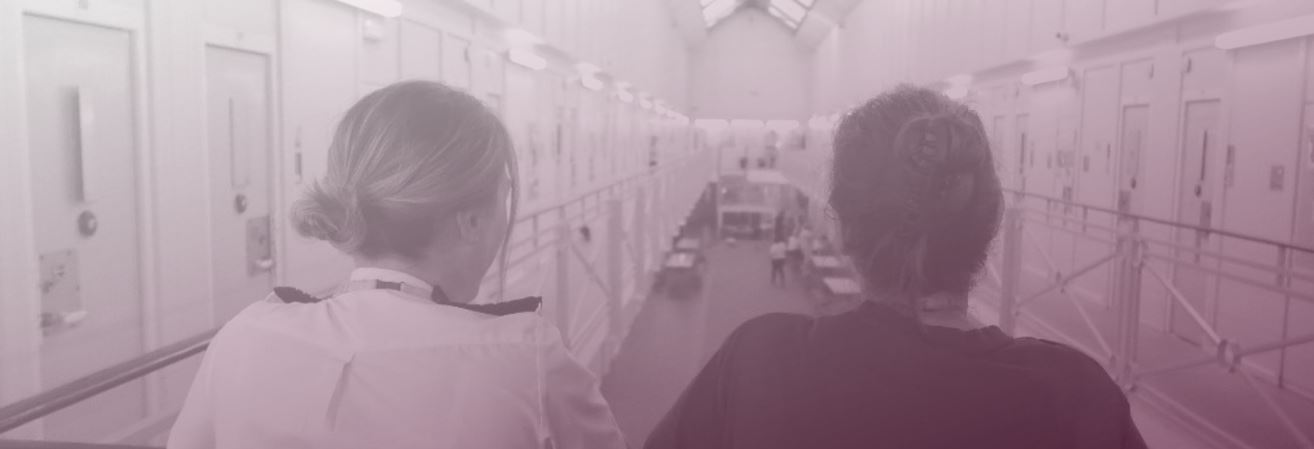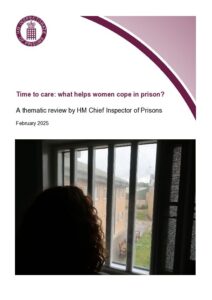Time to care: what helps women cope in prison?
A thematic review by HM Chief Inspector of Prisons, February 2025

The rate of self-harm among women in prison has rocketed in the last 10 years and is now 8.5 times higher than in men’s jails. (Back to top)
Rather than specific health care interventions, this thematic focuses on what practical support officers and leaders can offer women to reduce the likelihood that they will resort to self-harm.
We found that the paucity of regimes, the difficulties in enabling visits, and the lack of training or support for officers all contributed to a failure to help women cope. Staff spent a lot of their time helping women suffering acute crises, leaving little time to provide less intensive yet vital support for other women, which was taking a toll on the mental health of both staff and the women in their care.
The audio clips below, although spoken by HMI Prisons staff, are direct quotes from the prisoners and prison officers we interviewed for this report.
Phone calls with family and friends were very important to women. (Back to top)
“It gives you a bit of normality, doesn’t it? Hearing their friendly voices and giving you bits of encouragement that this isn’t the end, you’re not going to be in jail forever.”
“You need to know that there’s people out there who care about you and who support you. And if you haven’t got that, you feel like ‘what’s the point?”
“I’ll ring somebody every night… it’s only a 10-minute natter, it’s just hearing somebody outside.”
Staff had too little time to develop positive relationships with prisoners. (Back to top)
“They’re just always too busy, they’ve got other things to do. Just kind of brush you off because they’ve got other stuff to be doing, or they don’t know, or you get different answers from different staff members.”
“Support is mostly firefighting rather than building relationships, we are not dealing with requests.”
“Some officers are so drained that even if they have spare time, won’t go out and talk to a prisoner on their unit, will just stay in the office.”
Officers felt let down by inadequate training and traumatised by high levels of self-harm. (Back to top)
“The amount of trauma that these women have gone through is unimaginable if you haven’t listened to their stories.”
Referring to self-harm: “That this sort of thing is normalised, and people forget that it is not a normal thing to experience, that staff probably don’t talk enough.”
“I find it hard to go about my daily life as soon as I finish work because of what I have seen or heard.”
“You become desensitised to it; it becomes the norm.”
“The number of ligatures is horrific; we seem to not be able to cope.”
Looking after themselves and having something to do was important in helping women cope. (Back to top)
“Good to do activities, no one wants to be banged up, if you stay in your room it increases anxiety, is hard when you have nothing to do or look forward to.”
“I wash all my socks and underwear in the same bowl, but you only get one bowl and on a weekend, you get your razor. So, you got to do everything in that same bowl, so for me, that’s a lot, its unhygienic.”
Companionship and sharing experiences helped women to cope. (Back to top)
“It’s someone to talk to, isn’t it? And sometimes it’s better to talk to a prisoner. You’re in the same boat, being treated the same, rather than somebody who goes home at night.”
“A lot of the girls do help each other, and say they’ll listen if you’re worried about anything. Which is helpful from the girls who have more experience, because they can kind of like let you know what the score is.”
These files may not be suitable for users of assistive technology.
Request an accessible format
If you use assistive technology (such as a screen reader) and need a version of any of these documents in a more accessible format, please email media@hmiprisons.gov.uk. Please tell us what format you need. It will help us if you say what assistive technology you use.

